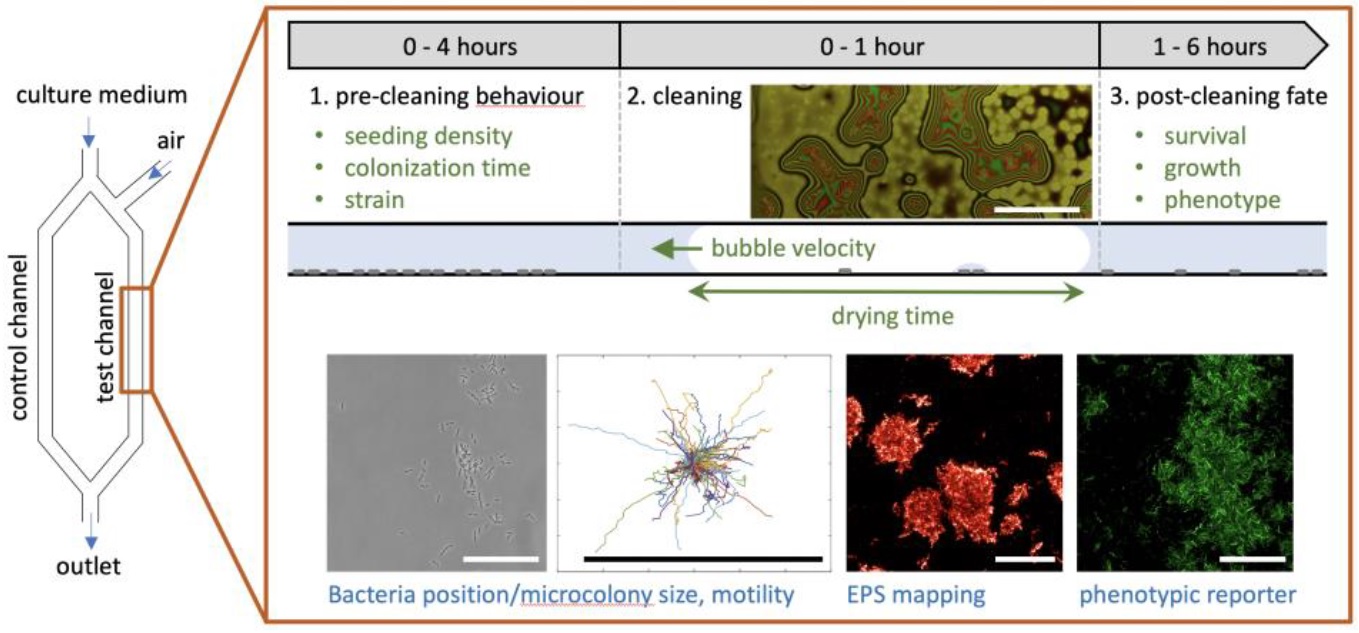- Share
- Share on Facebook
- Share on X
- Share on LinkedIn
Recruitment

Funded thesis offer 2025-2028
Supervision: S. Lecuyer (LPENSL) & D. Débarre (LIPhy)
Project summary
The spread of pathogenic micro-organisms from the surface of contaminated equipment represents a major public health issue, causing nosocomial infections or food spoilage. Surface contamination by bacteria involves the secretion of an extracellular matrix that greatly increases resistance to chemical, pharmaceutical or mechanical assaults. Current strategies to remove surface-attached bacteria in hard-to-reach, confined environments mostly rely on the use of environmentally hazardous chemicals, or antibiotics that lead to the emergence of resistant strains. In this context, there is a strong drive to devise milder and greener strategies for surface decontamination, such as processes based on the mechanical action of a moving air/liquid interface and subsequent surface drying.
This PhD proposal aims to investigate experimentally the physico-chemical aspects of bubble-mediated surface decontamination, and how an imperfect cleaning procedure may induce the emergence of mechanically-resistant bacteria through selective survival on the surface.
The successful candidate will combine the experimental know-how of the involved teams in microbiology, microfluidics, microscopy and image analysis to study the role of the extracellular matrix in bacterial survival to mechanical decontamination. They will design and perform model experiments to image bacterial adhesion, colony formation, and subsequent removal or reorganisation of bacteria under the passage of a bubble in a flow channel. In a second part, they will also investigate whether sub-populations of bacteria with particular phenotypes are selected during bubble transit and drying, and whether drying could further modify gene expression and lead to increased resistance. Finally, they will interact with a team of soft matter physicists and theorists in an effort to model their experimental data using thin film hydrodynamics, dewetting and modelling of gel drying.
Location and practical aspects
The project is a collaborative effort between the Physics lab at ENS Lyon (LPENSL) and the Lab for Interdisciplinary Physics (LIPhy) in Grenoble. The 2 cities are major research centers in France located about 1h away from each other near the French Alps. Both labs bring together theoretical and experimental researchers covering a broad range of expertise including soft matter physics, biophysics, fluid mechanics, physico-chemistry, biology and optics.
The successful applicant will work under the co-supervision of Dr. Delphine Débarre (Grenoble) and Dr. Sigolène Lecuyer (Lyon). They will divide their time equally between Lyon and Grenoble. Existing contacts with microbiologists are also in place to access clinical isolates. Finally, international collaborations (Spain, UK, Japan, Germany) will provide a diversity of interactions.
The project is fully funded for 3 years, and can be started between September 2025 and
January 2026. The gross salary will be 2200 €/month (with additional benefits for health coverage, transportation, child support, etc.).
Qualifications of the applicant
We are looking for an enthusiastic and rigorous experimental physicist, biophysicist, bioengineer or microbiologist with a keen interest in multidisciplinary work. Experimental work will include microfluidics, microscopy and microbiology. No previous experience in these fields is required but good experimental skills and a taste for meticulousness are essential. Interest for soft matter concepts and modelling will help to interpret the data. Experience in data analysis (including programming) is a plus.
The working language of the team is English: a good level is required, as well as good communication skills to ensure efficient collaboration between the labs.
Applications
Interested candidates should write to Sigolène Lecuyer (sigolene.lecuyer ens-lyon.fr (sigolene[dot]lecuyer[at]ens-lyon[dot]fr)) and Delphine Débarre (delphine.debarre
ens-lyon.fr (sigolene[dot]lecuyer[at]ens-lyon[dot]fr)) and Delphine Débarre (delphine.debarre univ-grenoble-alpes.fr (delphine[dot]debarre[at]univ-grenoble-alpes[dot]fr)) with a motivation letter, CV, transcript of university record, and contact information of two referees (indicate “PhD studentship - Decontamination” as e-mail subject). Application deadline: 31/07/2025. Early applications are encouraged as the position may be filled before the deadline.
univ-grenoble-alpes.fr (delphine[dot]debarre[at]univ-grenoble-alpes[dot]fr)) with a motivation letter, CV, transcript of university record, and contact information of two referees (indicate “PhD studentship - Decontamination” as e-mail subject). Application deadline: 31/07/2025. Early applications are encouraged as the position may be filled before the deadline.
Download
PhD ENSLyon LIPhy surface decontamination.pdf (PDF, 176.56 KB)
Contact
Sigolène LECUYER
Laboratoire de Physique de l'ENS de Lyon
sigolene.lecuyer ens-lyon.fr (sigolene[dot]lecuyer[at]ens-lyon[dot]fr)
ens-lyon.fr (sigolene[dot]lecuyer[at]ens-lyon[dot]fr)
Delphine DEBARRE
MC2 team
delphine.debarre univ-grenoble-alpes.fr (delphine[dot]debarre[at]univ-grenoble-alpes[dot]fr)
univ-grenoble-alpes.fr (delphine[dot]debarre[at]univ-grenoble-alpes[dot]fr)
- Share
- Share on Facebook
- Share on X
- Share on LinkedIn